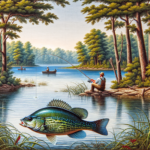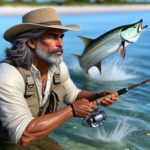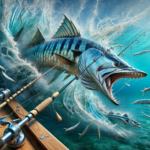Bluegill Fishing in Alabama’s Lakes and Reservoirs

Introduction
Did you know that Alabama is home to some of the best bluegill fishing in the United States? With its numerous lakes and reservoirs, the state offers a paradise for anglers looking to catch this popular freshwater fish. Whether you’re a seasoned fisherman or a novice looking to try your hand at bluegill fishing, Alabama’s diverse aquatic ecosystems provide ample opportunities for a rewarding experience.
This article will delve into the intricacies of bluegill fishing in Alabama’s lakes and reservoirs. We’ll cover everything from the historical and cultural significance of bluegill fishing in the state to the best techniques, gear, and locations for a successful fishing trip. Additionally, we’ll provide tips on seasonal variations, local regulations, and even upcoming events and tournaments. By the end of this guide, you’ll be well-equipped to make the most of your bluegill fishing adventure in Alabama.
Why does this matter? Bluegill fishing is not just a pastime; it’s a way to connect with nature, enjoy the outdoors, and even contribute to local conservation efforts. Understanding the best practices and techniques can enhance your experience and ensure that you’re fishing responsibly.
Background/Context
Historical or Cultural Significance
Bluegill fishing has deep roots in Alabama’s history and culture. Known scientifically as Lepomis macrochirus, bluegill is a species of freshwater fish native to North America. In Alabama, bluegill fishing has been a popular activity for generations, often serving as a rite of passage for young anglers. The fish is known for its fighting spirit, making it a favorite among sport fishermen. Additionally, bluegill is a staple in many local cuisines, often fried or grilled to perfection.
Geographical Overview
Alabama boasts a diverse range of lakes and reservoirs, each offering unique fishing opportunities. The state’s climate is generally warm and humid, providing ideal conditions for bluegill to thrive. Key water bodies include Lake Guntersville, Wheeler Lake, and the Alabama River, among others. These lakes are characterized by their varied topography, including shallow coves, deep channels, and abundant aquatic vegetation, all of which create perfect habitats for bluegill.
Key Points/Details
Fishing Techniques
Technique Overview
When it comes to bluegill fishing, several techniques can be employed to increase your chances of success. These include:
- Bait Fishing: Using live bait such as worms, crickets, or small minnows.
- Fly Fishing: Employing small, lightweight flies that mimic insects.
- Spinning: Using small spinners or jigs to attract bluegill.
When and Where to Use
The best time to fish for bluegill is during their spawning season, which typically occurs from late spring to early summer. During this period, bluegill can be found in shallow waters near the shore. Key locations include:
- Lake Guntersville: Known for its abundant bluegill population, especially in the shallow coves.
- Wheeler Lake: Offers excellent fishing spots near aquatic vegetation.
- Alabama River: Ideal for both bait and fly fishing techniques.
Recommended Gear
For a successful bluegill fishing trip, consider the following gear:
- Rods: Light to ultralight spinning rods or fly rods.
- Reels: Spinning reels with a smooth drag system.
- Lines: 4-6 lb test monofilament or fluorocarbon lines.
- Bait/Lures: Live bait such as worms or crickets, small spinners, and jigs.
Species Information
Species Overview
Bluegill are a type of sunfish known for their distinctive blue and green coloration and a dark spot at the base of their dorsal fin. They prefer warm, slow-moving waters with plenty of vegetation. Bluegill are most active during the day, especially in the early morning and late afternoon.
Best Practices
To successfully catch bluegill, consider the following tips:
- Use Small Hooks: Bluegill have small mouths, so opt for size 6-10 hooks.
- Fish Near Vegetation: Bluegill often hide in aquatic plants, so target these areas.
- Be Patient: Bluegill can be cautious, so give them time to take the bait.
Location Information
Top Fishing Spots
Alabama offers numerous prime locations for bluegill fishing:
- Lake Guntersville: Known for its large bluegill population and easy access points.
- Wheeler Lake: Offers diverse fishing environments, from shallow coves to deep channels.
- Alabama River: Provides excellent opportunities for both shore and boat fishing.
Regulations and Licenses
Before heading out, make sure to familiarize yourself with local fishing regulations. In Alabama, anglers aged 16-64 need a fishing license. Regulations may include catch limits and seasonal restrictions, so check the Alabama Department of Conservation and Natural Resources website for the most up-to-date information.
Seasonal Considerations
Seasonal Variations
Fishing conditions in Alabama can vary significantly throughout the year:
- Spring: Ideal for bluegill fishing as they move to shallow waters to spawn.
- Summer: Bluegill remain active but may move to deeper waters during the hottest part of the day.
- Fall: Cooler temperatures bring bluegill back to shallower waters.
- Winter: Bluegill activity slows down, and they move to deeper, warmer waters.
Best Times to Fish
The optimal times for bluegill fishing are early morning and late afternoon when the fish are most active. During the spawning season, focus on shallow waters near the shore.
Events and Tournaments
Event Overview
Alabama hosts several fishing events and tournaments throughout the year. These events provide opportunities to test your skills and meet fellow anglers. Notable events include:
- Alabama Bass Trail Tournament Series: While primarily focused on bass, these events often include bluegill categories.
- Local Fishing Derbies: Community events that often feature bluegill fishing competitions.
Preparation Tips
To prepare for a fishing event or tournament, consider the following tips:
- Practice: Spend time fishing in the tournament area to familiarize yourself with the conditions.
- Gear Check: Ensure all your equipment is in good working order.
- Strategy: Develop a plan based on the specific rules and conditions of the event.
Tips and Best Practices
General Tips
Here are some general tips to enhance your bluegill fishing experience:
- Stay Quiet: Bluegill are easily spooked, so minimize noise and movement.
- Use Light Tackle: Light rods and lines provide better sensitivity and control.
- Observe the Water: Look for signs of bluegill activity, such as surface ripples or jumping fish.
Avoid Common Mistakes
Common mistakes to avoid include:
- Using Large Hooks: Bluegill have small mouths, so use appropriately sized hooks.
- Fishing in the Wrong Areas: Focus on areas with vegetation and structure.
- Ignoring Seasonal Changes: Adjust your techniques based on the time of year.
Advanced Techniques
For those looking to take their bluegill fishing to the next level, consider these advanced techniques:
- Fly Fishing: Mastering fly fishing can provide a more challenging and rewarding experience.
- Using Artificial Lures: Experiment with small jigs and spinners to attract bluegill.
- Night Fishing: Bluegill can be active at night, especially during the summer months.
Gear and Equipment Recommendations
Essential Gear
For a successful bluegill fishing trip, you’ll need the following essential gear:
- Light Spinning Rod: A 5-7 foot light or ultralight rod.
- Spinning Reel: A reel with a smooth drag system and a 4-6 lb test line.
- Hooks: Size 6-10 hooks.
- Bait: Live bait such as worms or crickets.
Optional Gear/Upgrades
Consider these optional upgrades to enhance your fishing experience:
- Fly Rod: For those interested in fly fishing.
- Fish Finder: Useful for locating bluegill in deeper waters.
- Tackle Box: A well-organized tackle box can make your fishing trip more efficient.
Where to Buy or Rent
You can purchase or rent fishing gear from local shops or online stores. Notable local shops in Alabama include:
- Bass Pro Shops: Locations in Leeds and Prattville.
- Academy Sports + Outdoors: Multiple locations across the state.
- Local Bait Shops: Often provide specialized gear and local fishing advice.
Safety and Conservation
Safety Tips
Safety should always be a priority when fishing. Consider the following tips:
- Weather Awareness: Check the weather forecast and be prepared for sudden changes.
- Life Jackets: Always wear a life jacket when fishing from a boat.
- Hydration: Bring plenty of water, especially during hot weather.
Conservation Practices
Sustainable fishing practices are crucial for preserving bluegill populations. Follow these guidelines:
- Catch and Release: Release smaller fish to allow them to grow and reproduce.
- Respect Regulations: Adhere to local fishing regulations and catch limits.
- Avoid Littering: Dispose of trash properly and keep the fishing area clean.
Planning Your Trip
Accommodations
If you’re planning an extended fishing trip, consider staying at one of these accommodations near popular fishing spots:
- Lake Guntersville State Park Lodge: Offers comfortable lodging with easy access to the lake.
- Wheeler Lake Campground: Provides camping facilities near prime fishing areas.
- Local Hotels: Numerous hotels and motels are available near major lakes and reservoirs.
Travel Tips
Getting to Alabama’s top fishing spots is relatively straightforward. Here are some travel tips:
- Driving: Most lakes and reservoirs are accessible by car, with ample parking available.
- Boat Rentals: Many locations offer boat rentals for easier access to prime fishing areas.
- Local Guides: Consider hiring a local fishing guide for expert advice and access to lesser-known spots.
Additional Activities
If you’re traveling with family or friends who aren’t as interested in fishing, consider these additional activities:
- Hiking: Many lakes have nearby hiking trails with beautiful scenery.
- Wildlife Watching: Alabama’s lakes are home to diverse wildlife, perfect for birdwatching and nature photography.
- Local Attractions: Explore nearby towns and attractions for a well-rounded trip.
Frequently Asked Questions (FAQs)
What is the best time of year to fish for bluegill in Alabama?
The best time to fish for bluegill in Alabama is during their spawning season, which typically occurs from late spring to early summer. Early morning and late afternoon are the optimal times of day.
Do I need a fishing license to fish for bluegill in Alabama?
Yes, anglers aged 16-64 need a fishing license to fish in Alabama. Licenses can be purchased online or at local retailers.
What type of bait is best for bluegill fishing?
Live bait such as worms, crickets, and small minnows are highly effective for bluegill fishing. Small artificial lures like spinners and jigs can also be used.
Are there any local fishing tournaments for bluegill in Alabama?
Yes, Alabama hosts several fishing events and tournaments throughout the year, including local fishing derbies and the Alabama Bass Trail Tournament Series, which often feature bluegill categories.
Conclusion
Bluegill fishing in Alabama’s lakes and reservoirs offers a rewarding experience for anglers of all skill levels. With its rich history, diverse ecosystems, and numerous prime fishing spots, Alabama is a top destination for bluegill enthusiasts. By following the tips and best practices outlined in this guide, you’ll be well-prepared for a successful and enjoyable fishing trip. So grab your gear, head to one of Alabama’s beautiful lakes, and start reeling in those bluegill!




